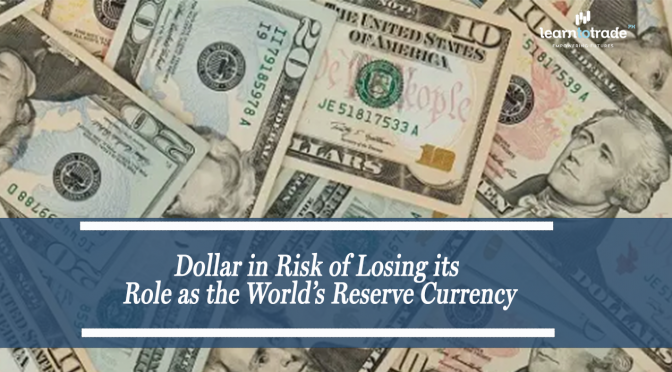-

Due to arising internal conflicts caused by the Covid-19 pandemic and dispute between China and USA, the dollar has been weakening against the Euro.
Banks such as the Bank of Russia has been receiving more Euros than dollars for its export to China as reflected in their new data’s. The share of goods purchased has risen from 0.3% at the start of 2014 to nearly 51% at the end of Q1 this year. The data also shows that the share of euros Russia receives for the exports to the European Union increased to 43% from 38% last year.
Efforts by Russia and China seems to increase the Euro’s use could make the continental currency a serious challenger to the US dollar as the world’s reserve currency.
Currency strategists from Goldman Sachs have pointed their analysis to the rising value of gold against the U.S. dollar stating the dollar could be “debasing” it’s currency and creating “real concerns around the longevity of the U.S. dollar as reserve currency”
Many central banks have increased their purchases of gold such as those from China, Russia, India and Turkey with 2018 and 2019 the first and second years for annual purchase on record.
This has been a moment of weakness for the US dollar as efforts from China and Russia to move the world away from the dollar seems up close which is now aligning with the global problem caused by the coronavirus pandemic.
Meanwhile, in the internal conflicts of USA, investors are confused by the U.S dollar’s accelerating decline.
“The state of political disarray is clearly weighing on the buck as the failure to produce more fiscal stimulus and the clearly partisan skirmishing over mail-in voting that threatens to undermine the credibility of the election are all taking their toll on the dollar” – Boris Schlosserg, managing director at BK Asset Management.
Extensions on Unemployment Benefits
Unemployment benefits lapsed at the end of July and had Washington in a deadlock over extending fiscal aid packages and included $600 a week in additional unemployment benefits. President Donald Trump earlier this month sign executive orders aimed at providing up to$400 a week in additional benefits, but the order faces logistical and political challenges.
According to news reports, a scaled back stimulus plan will be introduced this week by Senate Republicans that would include $300 a week in additional benefits.
Tension of upcoming election
Analysts cited that the upcoming election in November was a possible driver for the dollars July swoon. Some dollar watchers have expressed fear that the dollar could fall way lower in the event of election-related issues.
The US dollars weakens due to lagging of U.S. response to resolve the pandemic despite seeing the rest of the world progress in containing the virus.
The Federal Reserve responded stating that they will provide additional stimulus if the economic rebound stalls, particularly if politicians remain stalemated to respond in the ongoing pandemic which stated by analysts as the primary driver for the dollar’s decline.
“The Fed seems certain to loosen its interpretation of its inflation mandate, and is working hand-in-glove with the government to make sure that funds are available to finance fiscal spending, yet 5-year/5-year inflation swaps [a measure of future inflation expectations] are at 2%, just 0.1% above the average CPI rate of the last decade,” said Kit Juckes, global macro strategist at Société Générale, in a note.
“When I look at it like that, the very least I should expect is that the Fed manages to significantly cheapen the dollar. In real terms, it’s about 7% off its peak, but it’s still 25% above the 2011 levels,” he said.
Do you want to learn more about forex trading? Sign up now on our FREE forex webinar and reserve your FREE seats while it still lasts!
Risk Disclaimer:
Information on this page are solely for educational purposes only and is not in any way a recommendation to buy or sell certain assets. You should do your own thorough research before investing in any type of asset. Learn to Trade does not fully guarantee that this information is free from errors or misstatements. It also does not guarantee that the information is completely timely. Investing in the Foreign Exchange Market involves a great deal of risk which may result in the loss of a portion or your full investment. All risks, losses and costs associated with investing, including total loss of principal and emotional distress, are your responsibility.








































By bsuper
| No Comments